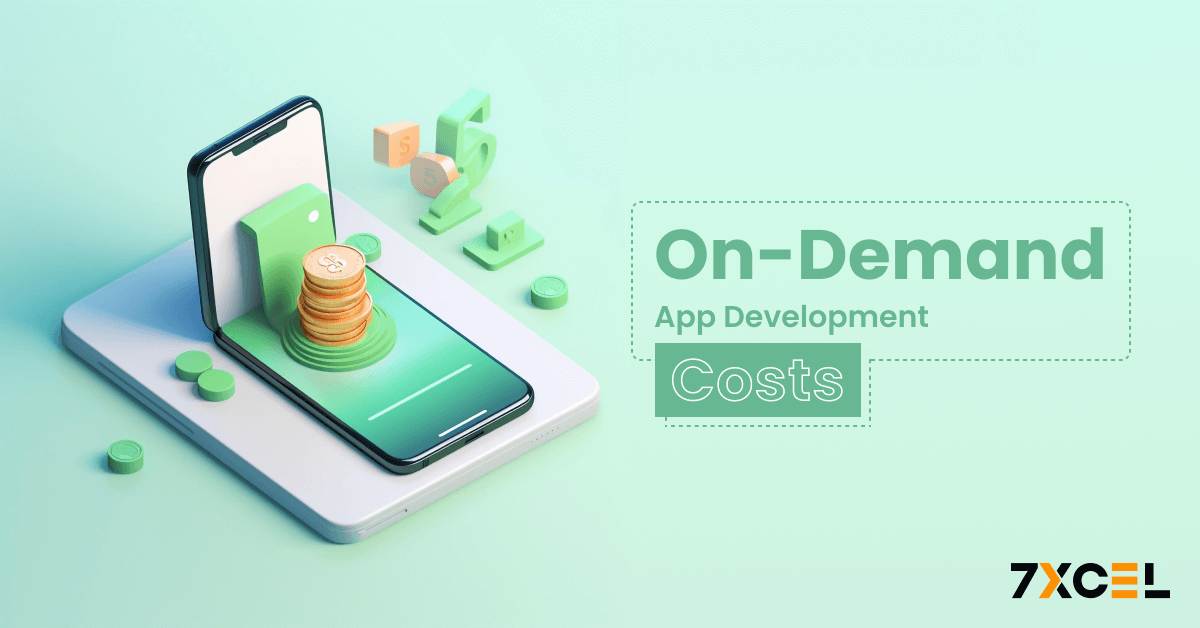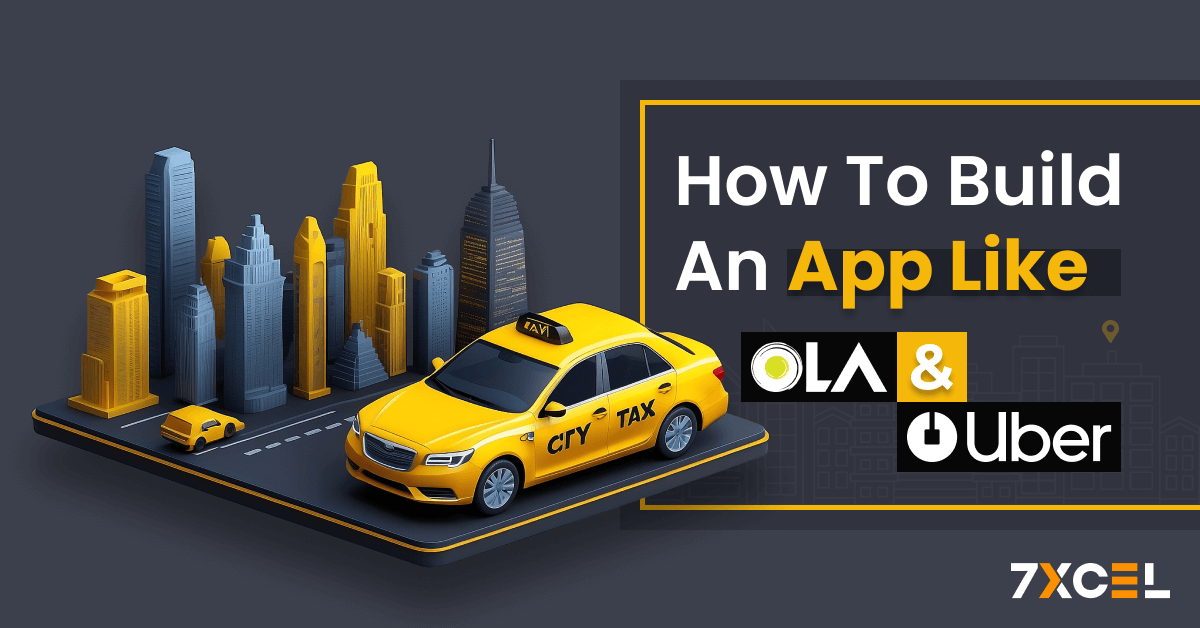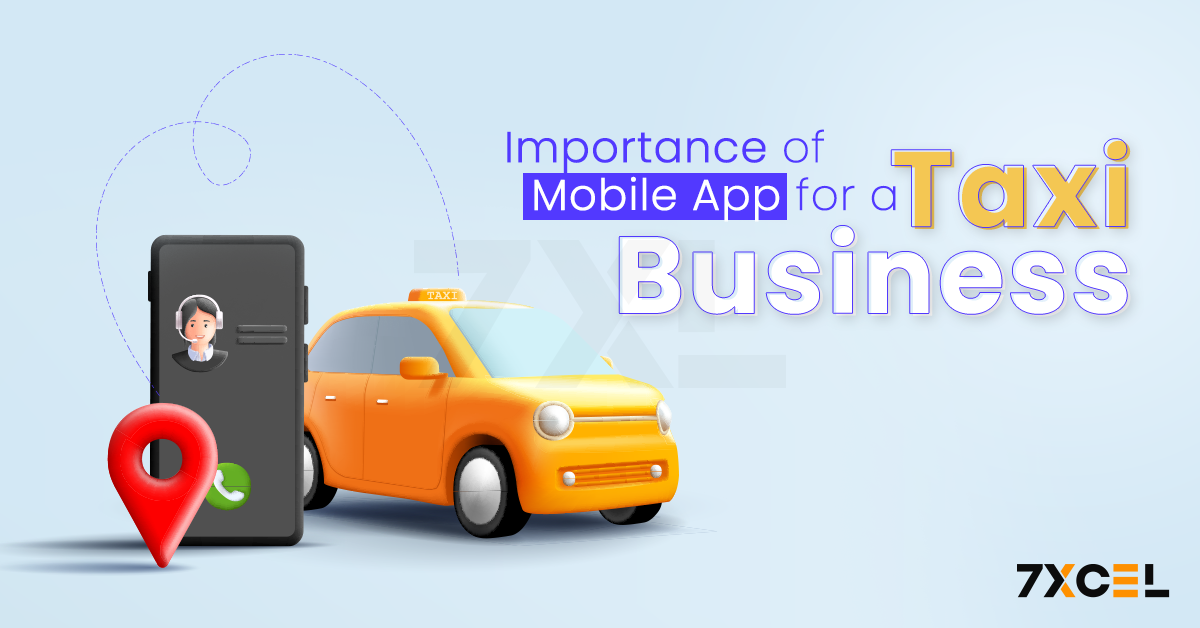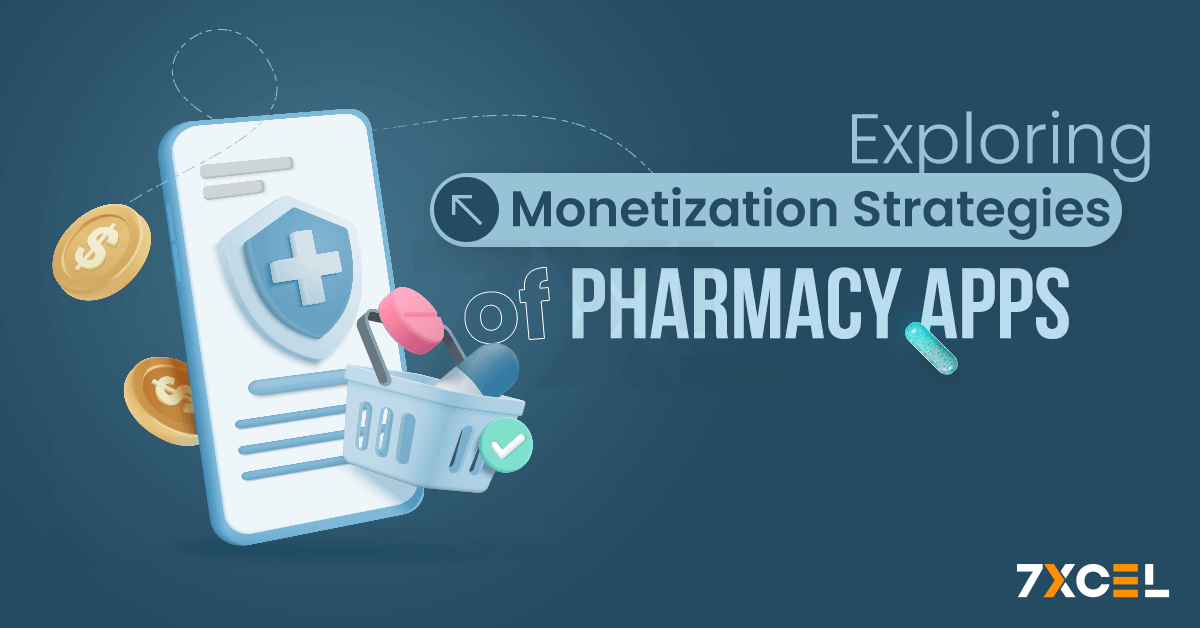Quick Summary:
Developing an on-demand app involves significant investment, with costs varying widely based on specific requirements and complexity. Understanding these costs is crucial for effective planning and budgeting to ensure the app meets market demands and user expectations.
The on-demand app industry has rapidly transformed various sectors, offering users convenience and efficiency. However, developing an on-demand app is a complex and costly process. This guide explores the essential factors and features that contribute to the overall cost of on-demand app development. Understanding these expenses is crucial for businesses planning to enter this market, as it helps in effective budgeting and ensures the app’s long-term success. By the end of the blog, you’ll gain insight into the financial aspects of creating a successful on-demand app.
Factors Influencing On-Demand App Development Costs
Developing an on-demand app involves various cost-driving factors that businesses need to consider. These factors impact the overall budget and determine the feasibility of the project. Here are the primary factors influencing the cost of on-demand app development:
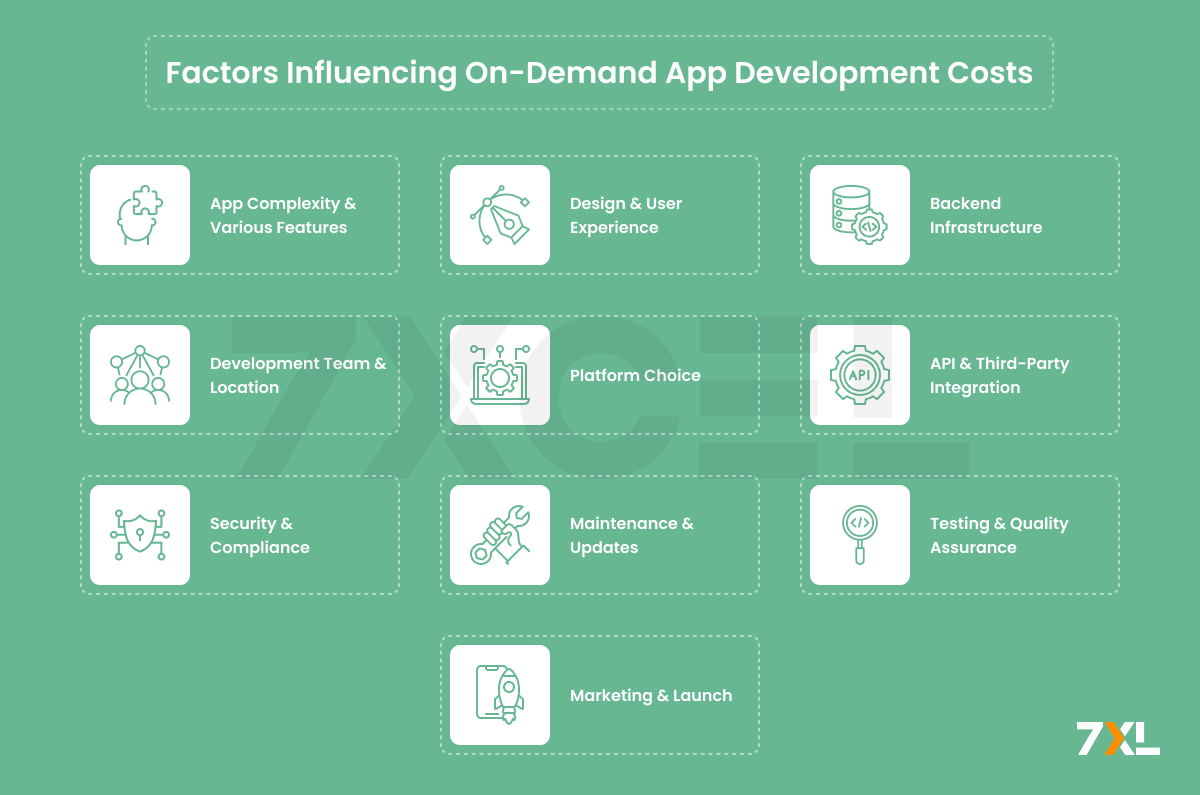
1. App Complexity and Features:
The complexity and variety of features incorporated into the app are major cost drivers. Simple apps with basic functionalities, such as user registration and standard payment gateways, typically range from $30,000 to $120,000. In contrast, apps with advanced features like real-time tracking, AI-driven recommendations, and extensive backend requirements can exceed $300,000. The more complex the app, the higher the development cost.
2. Design and User Experience (UX):
A well-designed app with a user-friendly interface is crucial for retaining users and providing a seamless experience. Basic design using standard templates might cost between $10,000 and $30,000. Custom designs that involve intricate animations and bespoke UI elements can elevate costs to $30,000 to $50,000 or more. Investing in high-quality UX design is essential for creating an engaging and intuitive app.
3. Backend Infrastructure:
The backend infrastructure supports the app’s core functionalities, including data storage, server management, and integration with third-party services. Basic backend infrastructure, which handles simple data management and user operations, typically costs between $20,000 and $50,000. For more complex apps requiring real-time data processing and advanced integrations, the cost can range from $50,000 to $100,000. A robust backend is critical for ensuring app scalability and performance.
4. Development Team and Location:
The location of the development team has a substantial impact on the cost of app development. With hourly prices between $100 and $250, hiring developers in North America and Europe can be more costly. On the other hand, teams from Asia or Eastern Europe charge between $20 and $70 per hour, which is more affordable. Furthermore, the development team’s size and level of experience might affect total expenses; larger, more specialized teams usually charge more.
| Location | Description | Estimated Hourly Rate | Cost Impact |
| North America | High development quality with extensive expertise. Costs are higher due to higher wages and operational costs. | $100 – $250/hour | High overall development cost |
| Western Europe | Similar to North America, with high-quality development and higher costs. Regional differences may apply. | $100 – $250/hour | High overall development cost |
| Eastern Europe | Cost-effective with good quality development. Known for offering a balance between cost and quality. | $40 – $70/hour | Moderate overall development cost |
| Asia | Most cost-effective option. Development quality varies, and may require more oversight to maintain standards. | $20 – $50/hour | Low overall development cost |
| South America | Offers a mix of cost and quality. Generally less expensive than North America and Europe, but more than Asia. | $30 – $60/hour | Moderate overall development cost |
| Australia/Oceania | Quality development with costs comparable to North America and Western Europe, sometimes slightly lower. | $70 – $150/hour | High to moderate overall development cost |
5. Platform Choice:
The total cost depends on whether the software is developed for iOS, Android, or both platforms. The cost of developing on one platform might be anything from $15,000 to $30,000, whereas cross-platform development with React Native or Flutter frameworks can cost anywhere from $25,000 to $45,000. Using a single codebase, cross-platform development can enable enterprises to reach a larger audience at a lower cost.
| Platform Choice | Description | Estimated Development Cost | Cost Impact |
| iOS Only | Development for Apple devices (iPhone, iPad). Typically requires Swift or Objective-C expertise. | $15,000 – $30,000 | Lower initial cost, single platform |
| Android Only | Development for Android devices. Requires Kotlin or Java expertise. | $15,000 – $30,000 | Lower initial cost, single platform |
| Cross-Platform | Development for both iOS and Android using frameworks like Flutter or React Native, allowing code reuse. | $25,000 – $45,000 | Cost-effective, broader reach |
| Web-Based | Development of a web app that works across devices with a responsive design. | $10,000 – $20,000 | Lower cost, broad compatibility |
| Hybrid | Combines native and web elements, often using frameworks like Ionic or Cordova, suitable for both platforms. | $20,000 – $35,000 | Moderate cost, flexible deployment |
6. API and Third-Party Integration:
Integrating external APIs and third-party services, such as payment gateways, geolocation, and push notifications, adds to the app’s cost. Basic integrations might cost between $5,000 and $15,000. More complex integrations, which include multiple services and advanced functionalities, can increase costs to $20,000 to $30,000. These integrations are essential for enhancing the app’s functionality and user experience.
7. Security and Compliance:
Ensuring the app complies with security standards and regulations is crucial, especially for apps handling sensitive user data. Basic security measures might cost between $10,000 and $20,000. For apps requiring comprehensive compliance with data protection laws and industry standards, the cost can rise to $20,000 to $40,000. Investing in security and compliance is necessary to protect user data and maintain trust.
8. Maintenance & Updates:
Updating and maintaining the app on a regular basis is essential to keeping it secure, functioning, and current with emerging technologies. Annual maintenance expenses usually represent 15% to 20% of the original development cost. This covers new feature updates, performance improvements, and bug fixes. Continuous maintenance makes sure the software stays user-friendly and competitive.
9. Testing & Quality Assurance:
Thorough testing is essential to ensure the app is free from bugs and performs well across different devices and scenarios. Basic testing might cost between $5,000 and $15,000. Comprehensive testing, including usability testing, performance testing, and security testing, can increase costs to $20,000 to $40,000. Investing in quality assurance helps deliver a reliable and high-performing app.
10. Marketing and Launch:
Promoting the app and ensuring a successful launch requires a significant budget. Basic marketing efforts might cost between $5,000 and $15,000. Comprehensive marketing campaigns, which include social media promotion, influencer partnerships, and app store optimization, can elevate costs to $20,000 to $50,000. Effective marketing is crucial for attracting users and achieving a strong launch.
| Factor | Description | Estimated Cost |
| App Complexity and Features | The scope and range of features included in the app. More complex and feature-rich apps are costlier to develop. | -> Simple: $30,000 – $120,000 -> Complex: $200,000 – $300,000+ |
| Design and User Experience (UX) | The quality and complexity of the app’s design and user interface. Custom designs require more time and expertise. | -> Basic Design: $10,000 – $30,000 -> Custom Design: $30,000 – $50,000 |
| Backend Infrastructure | Includes server setup, data storage, database management, and integration with third-party services. | -> Basic Infrastructure: $20,000 – $50,000 -> Advanced Infrastructure: $50,000 – $100,000 |
| Development Team and Location | Development costs vary significantly by region. North America and Europe tend to be more expensive than Eastern Europe or Asia. | -> North America/Europe: $100 – $250/hour -> Eastern Europe: $40 – $70/hour – Asia: $20 – $50/hour |
| Platform Choice | Developing for iOS, Android, or both platforms. Cross-platform development can be more cost-effective. | -> Single Platform: $15,000 – $30,000 -> Cross-Platform: $25,000 – $45,000 |
| API and Third-Party Integration | Costs for integrating external services like payment gateways, geolocation, and notifications. | -> Basic Integration: $5,000 – $15,000 -> Advanced Integration: $20,000 – $30,000 |
| Security and Compliance | Ensuring the app meets security standards and regulatory compliance. | -> Basic Security: $10,000 – $20,000 -> Advanced Compliance: $20,000 – $40,000 |
| Maintenance and Updates | Ongoing costs for maintaining the app, fixing bugs, and providing updates. | -> Annual Maintenance: 15% – 20% of initial development cost |
| Testing and Quality Assurance | Testing the app to identify and fix bugs, ensuring it performs well across different devices. | -> Basic Testing: $5,000 – $15,000 -> Comprehensive Testing: $20,000 – $40,000 |
| Marketing and Launch | Costs associated with promoting the app, marketing campaigns, and ensuring a successful launch. | -> Basic Marketing: $5,000 – $15,000 -> Comprehensive Campaign: $20,000 – $50,000 |
Features Influencing On-Demand App Development Costs
Developing an on-demand app involves integrating various features that significantly impact the overall development cost. Each feature contributes to the app’s functionality, user experience, and scalability, which in turn influences the total budget required for development. Here’s a detailed breakdown of the key features and their impact on on-demand app development costs:
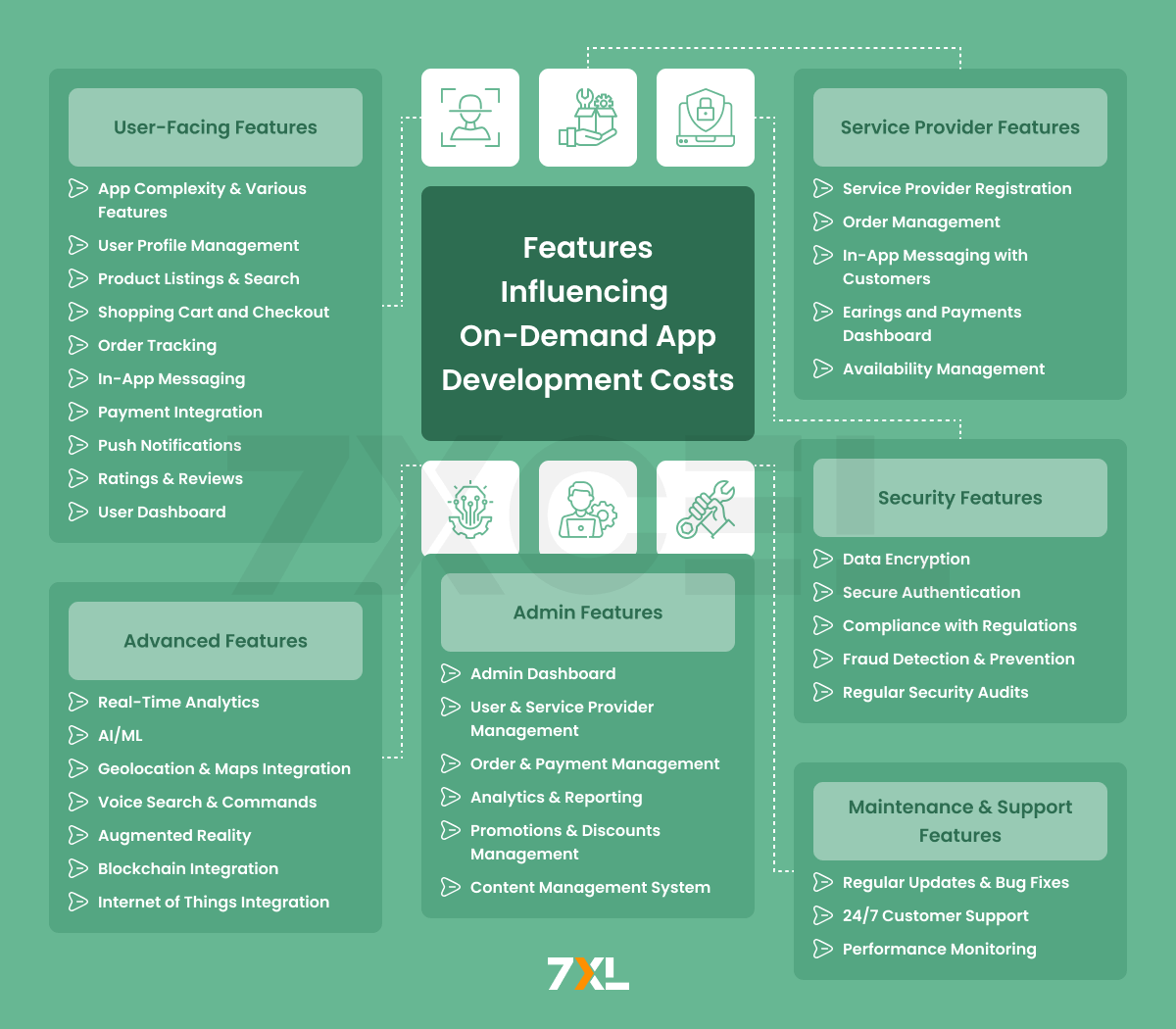
User-Facing Features
| Feature | Description | Benefits | Estimated Cost |
| User Registration and Authentication | Allows users to create accounts, log in securely, and manage profiles. | Facilitates personalized user experience and data security. | $3,000 – $5,000 |
| User Profile Management | Enables users to view and update personal information, payment methods, and order history. | Improves user engagement and convenience. | $2,000 – $4,000 |
| Product Listings and Search | Allows users to browse and search for products or services with filters and sorting options. | Enhances user experience and facilitates easy navigation. | $4,000 – $7,000 |
| Shopping Cart and Checkout | Enables users to add items to a cart and complete purchases with multiple payment options. | Simplifies the purchase process and enhances user convenience. | $5,000 – $8,000 |
| Order Tracking | Provides real-time updates on the status of orders, including GPS tracking for deliveries. | Increases transparency and customer satisfaction. | $7,000 – $12,000 |
| In-App Messaging | Allows users to communicate with service providers or customer support within the app. | Improves customer service and interaction. | $4,000 – $7,000 |
| Payment Integration | Supports various payment methods, including credit cards, digital wallets, and other gateways. | Facilitates secure and flexible transactions. | $5,000 – $10,000 |
| Push Notifications | Sends real-time alerts and updates to users about orders, promotions, and app activity. | Enhances user engagement and retention. | $2,000 – $4,000 |
| Ratings and Reviews | Enables users to rate services and products and leave feedback. | Builds trust and improves service quality. | $3,000 – $5,000 |
| User Dashboard | Provides users with a summary of their activities, orders, and preferences. | Enhances user experience and data accessibility. | $3,000 – $5,000 |
Service Provider Features
| Feature | Description | Benefits | Estimated Cost |
| Service Provider Registration | Allows service providers to create and manage their profiles, including verification processes. | Ensures a secure and trustworthy service network. | $3,000 – $5,000 |
| Order Management | Enables service providers to manage orders, update statuses, and track delivery progress. | Improves operational efficiency and transparency. | $5,000 – $8,000 |
| In-App Messaging with Customers | Facilitates communication between service providers and customers for order updates and special requests. | Enhances customer service and satisfaction. | $4,000 – $7,000 |
| Earnings and Payments Dashboard | Provides an overview of earnings, transaction history, and payout options for service providers. | Enhances transparency and financial management. | $4,000 – $6,000 |
| Availability Management | Allows service providers to set and update their availability for accepting orders. | Optimizes scheduling and resource allocation. | $2,000 – $4,000 |
Admin Features
| Feature | Description | Benefits | Estimated Cost |
| Admin Dashboard | Centralized control panel for managing users, orders, service providers, and app content. | Enhances management efficiency and oversight. | $10,000 – $15,000 |
| User and Service Provider Management | Allows admins to manage user and service provider accounts, including verification and support. | Improves platform security and trust. | $4,000 – $6,000 |
| Order and Payment Management | Enables admins to oversee order processing, payments, and issue resolution. | Ensures smooth operation and financial tracking. | $5,000 – $8,000 |
| Analytics and Reporting | Provides detailed insights into app usage, performance, and user behavior with customizable reports. | Supports data-driven decision-making. | $5,000 – $10,000 |
| Promotions and Discounts Management | Allows admins to create and manage promotional campaigns, discount codes, and special offers. | Drives user engagement and increases sales. | $3,000 – $6,000 |
| Content Management System (CMS) | Enables admins to manage and update app content, including product listings and service information. | Keeps app content relevant and up-to-date. | $4,000 – $6,000 |
Advanced Features
| Feature | Description | Benefits | Estimated Cost |
| Real-Time Analytics | Provides live insights into user activity, order status, and app performance. | Enhances decision-making and operational efficiency. | $7,000 – $10,000 |
| Artificial Intelligence (AI) and Machine Learning (ML) | Uses AI and ML for recommendations, predictive analysis, and automation. | Improves user personalization and operational automation. | $10,000 – $20,000 |
| Geolocation and Maps Integration | Integrates GPS and maps for real-time tracking, location-based services, and route optimization. | Enhances user experience and operational efficiency. | $5,000 – $8,000 |
| Voice Search and Commands | Allows users to interact with the app using voice commands for search and navigation. | Improves accessibility and user convenience. | $3,000 – $6,000 |
| Augmented Reality (AR) | Integrates AR for immersive experiences, such as virtual try-ons or navigation. | Enhances user engagement and interaction. | $10,000 – $15,000 |
| Blockchain Integration | Uses blockchain for secure transactions, data integrity, and transparency. | Increases security and trust in financial transactions. | $10,000 – $20,000 |
| Internet of Things (IoT) Integration | Connects the app to IoT devices for real-time data collection and smart home integration. | Enhances functionality and user interaction with connected devices. | $7,000 – $15,000 |
Security Features
| Feature | Description | Benefits | Estimated Cost |
| Data Encryption | Ensures sensitive data is encrypted during storage and transmission. | Protects user data and enhances security. | $3,000 – $6,000 |
| Secure Authentication | Implements methods like two-factor authentication and biometric login for user security. | Enhances user trust and security. | $3,000 – $5,000 |
| Compliance with Regulations | Ensures the app adheres to regulations such as GDPR for data protection and privacy. | Reduces legal risks and builds user trust. | $4,000 – $8,000 |
| Fraud Detection and Prevention | Uses tools and algorithms to detect and prevent fraudulent activities within the app. | Protects against financial loss and increases trust. | $4,000 – $8,000 |
| Regular Security Audits | Conducts periodic audits to identify and fix security vulnerabilities. | Ensures ongoing protection against threats. | $2,000 – $4,000 |
Maintenance and Support Features
| Feature | Description | Benefits | Estimated Cost |
| Regular Updates and Bug Fixes | Provides ongoing maintenance to fix bugs and ensure app functionality. | Enhances app performance and user satisfaction. | $5,000 – $10,000 annually |
| 24/7 Customer Support | Offers round-the-clock support for users through various channels such as chat, email, and phone. | Improves user satisfaction and retention. | $10,000 – $20,000 annually |
| Performance Monitoring | Monitors app performance and usage to identify issues and optimize performance. | Ensures app reliability and efficiency. | $3,000 – $5,000 annually |
These features collectively contribute to the overall functionality and user experience of an on-demand app. Understanding their costs and benefits helps businesses plan effectively, ensuring they build a competitive and user-friendly app that meets market demands.
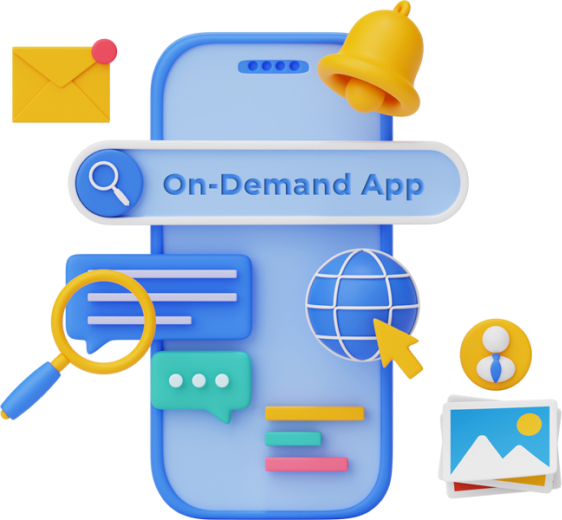
Want custom On-Demand App Solutions?
At 7xcel, our on-demand app solutions deliver customized, end-to-end excellence to meet all your specific needs efficiently.
Cost Breakdown for On-Demand App Development
Understanding the cost breakdown for different types of on-demand apps helps businesses plan their budgets effectively. Here’s a detailed look at the costs associated with simple, medium-complexity, and complex on-demand apps:
- Simple On-Demand Apps
Simple on-demand apps include basic features and functionalities, making them less expensive to develop. They are ideal for businesses looking to enter the market quickly with a minimal viable product (MVP).
Features:
- Basic user registration and authentication
- Simple product listings and search
- Standard checkout and payment processing
Estimated Cost: $30,000 to $120,000
- Medium-Complexity On-Demand Apps
These apps offer more sophisticated features like in-app messaging, multiple payment gateways, and enhanced search functionalities. They are suitable for businesses that need a more advanced solution to meet growing user demands.
Features:
- Enhanced product listings and search filters
- In-app messaging and notifications
- Multiple payment options and security features
Estimated Cost: $120,000 to $200,000
- Complex On-Demand Apps
Complex on-demand apps are feature-rich and require a significant investment. They include advanced functionalities such as real-time tracking, AI-driven recommendations, and robust backend infrastructure, catering to businesses looking for a comprehensive and scalable solution.
Features:
- Real-time order tracking and updates
- AI-powered recommendations and personalized content
- Integration with various third-party services and APIs
Estimated Cost: $200,000 to $300,000 or more
Examples of On-Demand Apps and Their Costs
Examining well-known on-demand apps provides insights into the cost and complexity of developing similar solutions. Here are a few examples:
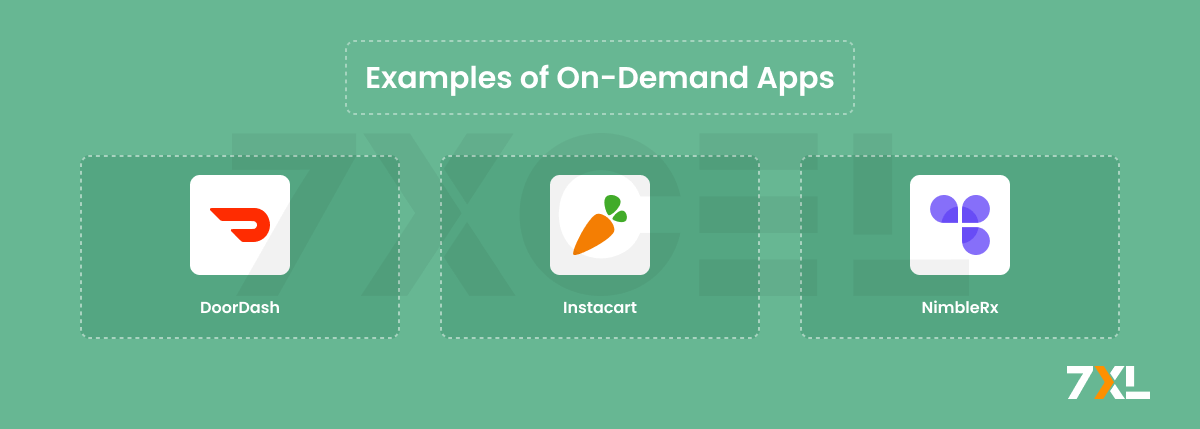
- DoorDash
Doordash is a leading food delivery app that connects users with local restaurants. It features real-time order tracking, multiple payment options, and a user-friendly interface.
- Estimated Cost: $100,000 to $150,000
- Instacart
An on-demand grocery delivery app like Instacart allowing users to shop from local stores and have their groceries delivered. It includes features like user profiles, product search, and real-time tracking.
- Estimated Cost: $150,000 to $200,000
- NimbleRx
NimbleRx is an on-demand prescription delivery app that facilitates easy prescription management and delivery from pharmacies to patients. It includes secure payment options, real-time notifications, and compliance with healthcare regulations.
- Estimated Cost: $100,000 to $150,000
Conclusion
Developing an on-demand app involves various cost factors, from feature complexity and design to backend infrastructure and team location. By understanding these components, businesses can make informed decisions, optimize their investment, and develop a user-friendly, competitive app that meets market demands. Whether you aim to build a simple or complex app, working with experienced developers is crucial to ensure a successful project that delivers a seamless user experience and drives business growth.
